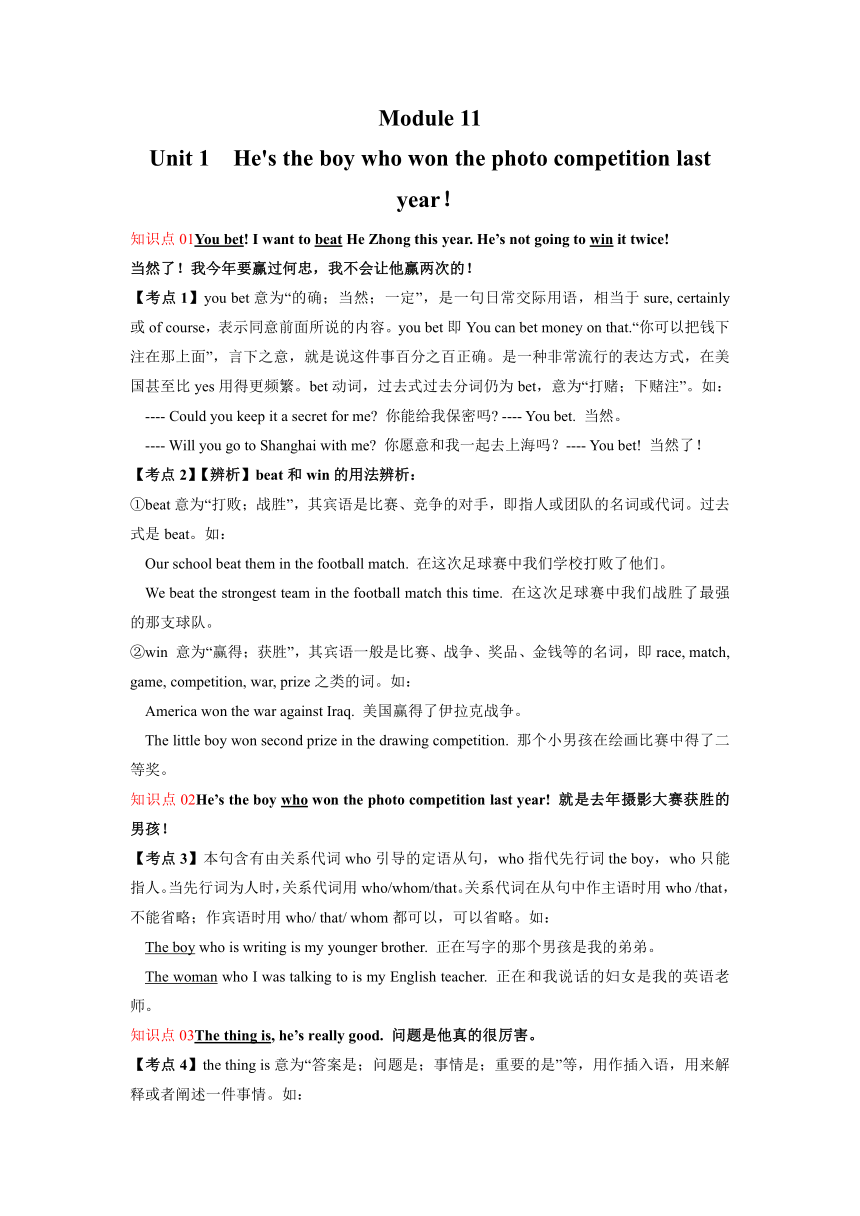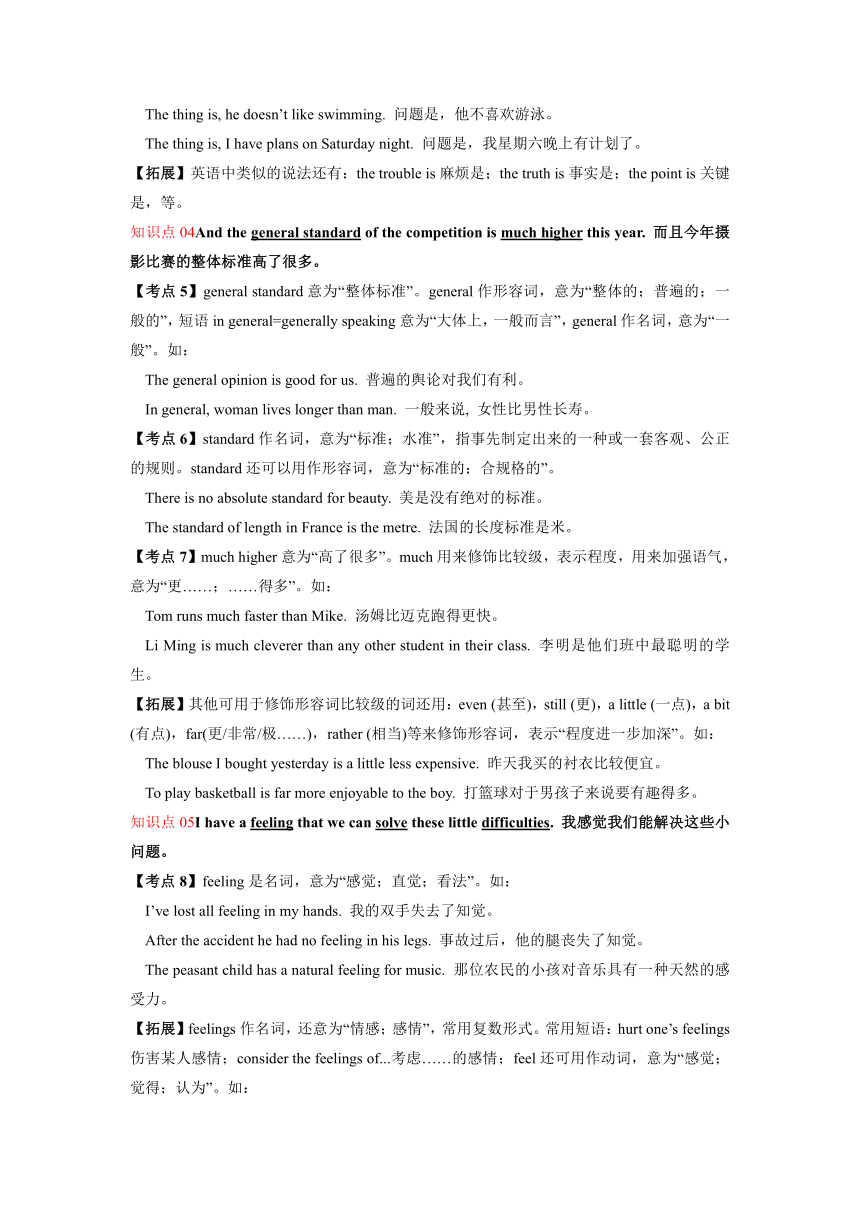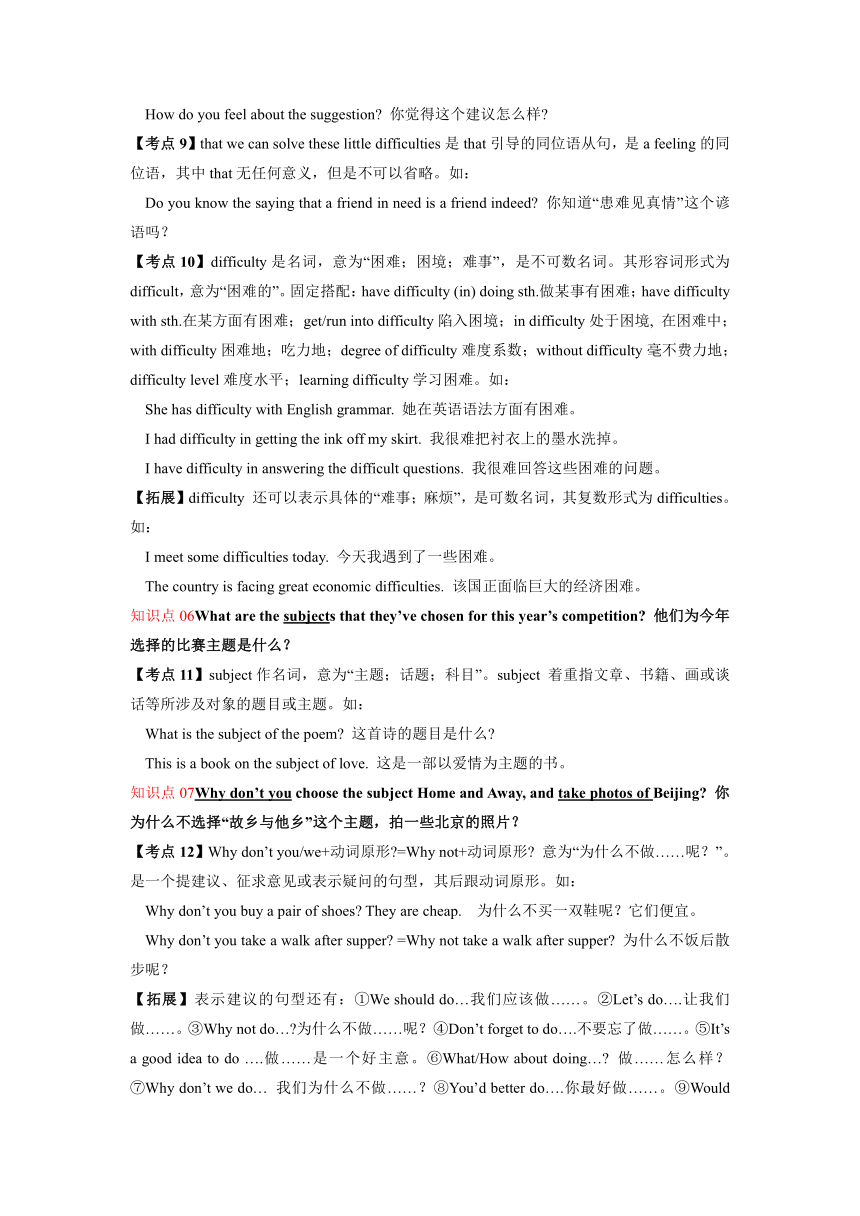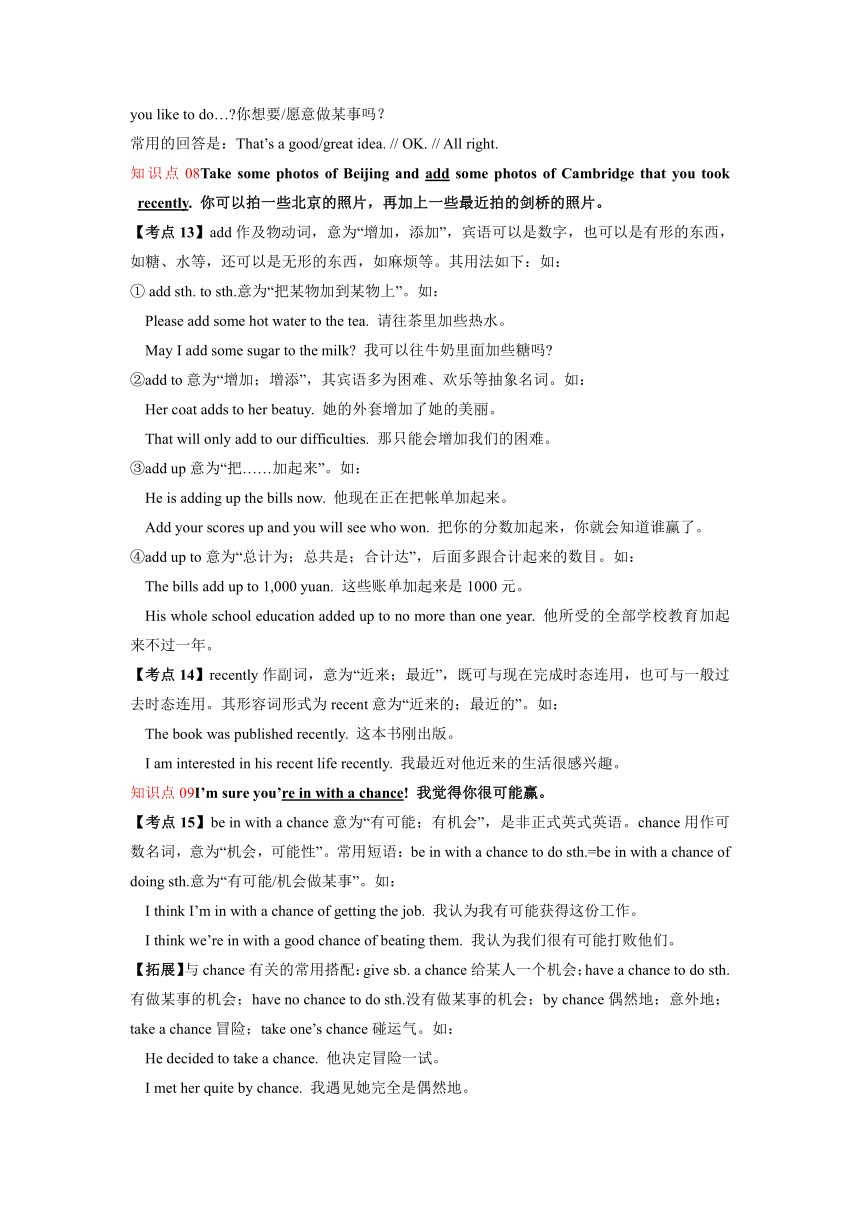Module 11 Unit 1 He's the boy who won the photo competition last year! 重点知识归纳和语法 讲解练习(含答案)
文档属性
| 名称 | Module 11 Unit 1 He's the boy who won the photo competition last year! 重点知识归纳和语法 讲解练习(含答案) |

|
|
| 格式 | zip | ||
| 文件大小 | 75.8KB | ||
| 资源类型 | 教案 | ||
| 版本资源 | 外研版 | ||
| 科目 | 英语 | ||
| 更新时间 | 2023-01-17 00:00:00 | ||
图片预览




文档简介
Module 11
Unit 1 He's the boy who won the photo competition last year!
知识点01You bet! I want to beat He Zhong this year. He’s not going to win it twice!
当然了!我今年要赢过何忠,我不会让他赢两次的!
【考点1】you bet意为“的确;当然;一定”,是一句日常交际用语,相当于sure, certainly或of course,表示同意前面所说的内容。you bet即You can bet money on that.“你可以把钱下注在那上面”,言下之意,就是说这件事百分之百正确。是一种非常流行的表达方式,在美国甚至比yes用得更频繁。bet动词,过去式过去分词仍为bet,意为“打赌;下赌注”。如:
---- Could you keep it a secret for me 你能给我保密吗 ---- You bet. 当然。
---- Will you go to Shanghai with me 你愿意和我一起去上海吗?---- You bet! 当然了!
【考点2】【辨析】beat和win的用法辨析:
①beat意为“打败;战胜”,其宾语是比赛、竞争的对手,即指人或团队的名词或代词。过去式是beat。如:
Our school beat them in the football match. 在这次足球赛中我们学校打败了他们。
We beat the strongest team in the football match this time. 在这次足球赛中我们战胜了最强的那支球队。
②win 意为“赢得;获胜”,其宾语一般是比赛、战争、奖品、金钱等的名词,即race, match, game, competition, war, prize之类的词。如:
America won the war against Iraq. 美国赢得了伊拉克战争。
The little boy won second prize in the drawing competition. 那个小男孩在绘画比赛中得了二等奖。
知识点02He’s the boy who won the photo competition last year! 就是去年摄影大赛获胜的男孩!
【考点3】本句含有由关系代词who引导的定语从句,who指代先行词the boy,who只能指人。当先行词为人时,关系代词用who/whom/that。关系代词在从句中作主语时用who /that,不能省略;作宾语时用who/ that/ whom都可以,可以省略。如:
The boy who is writing is my younger brother. 正在写字的那个男孩是我的弟弟。
The woman who I was talking to is my English teacher. 正在和我说话的妇女是我的英语老师。
知识点03The thing is, he’s really good. 问题是他真的很厉害。
【考点4】the thing is意为“答案是;问题是;事情是;重要的是”等,用作插入语,用来解释或者阐述一件事情。如:
The thing is, he doesn’t like swimming. 问题是,他不喜欢游泳。
The thing is, I have plans on Saturday night. 问题是,我星期六晚上有计划了。
【拓展】英语中类似的说法还有:the trouble is麻烦是;the truth is事实是;the point is关键是,等。
知识点04And the general standard of the competition is much higher this year. 而且今年摄影比赛的整体标准高了很多。
【考点5】general standard意为“整体标准”。general作形容词,意为“整体的;普遍的;一般的”,短语in general=generally speaking意为“大体上,一般而言”,general作名词,意为“一般”。如:
The general opinion is good for us. 普遍的舆论对我们有利。
In general, woman lives longer than man. 一般来说, 女性比男性长寿。
【考点6】standard作名词,意为“标准;水准”,指事先制定出来的一种或一套客观、公正的规则。standard还可以用作形容词,意为“标准的;合规格的”。
There is no absolute standard for beauty. 美是没有绝对的标准。
The standard of length in France is the metre. 法国的长度标准是米。
【考点7】much higher意为“高了很多”。much用来修饰比较级,表示程度,用来加强语气,意为“更……;……得多”。如:
Tom runs much faster than Mike. 汤姆比迈克跑得更快。
Li Ming is much cleverer than any other student in their class. 李明是他们班中最聪明的学生。
【拓展】其他可用于修饰形容词比较级的词还用:even (甚至),still (更),a little (一点),a bit (有点),far(更/非常/极……),rather (相当)等来修饰形容词,表示“程度进一步加深”。如:
The blouse I bought yesterday is a little less expensive. 昨天我买的衬衣比较便宜。
To play basketball is far more enjoyable to the boy. 打篮球对于男孩子来说要有趣得多。
知识点05I have a feeling that we can solve these little difficulties. 我感觉我们能解决这些小问题。
【考点8】feeling是名词,意为“感觉;直觉;看法”。如:
I’ve lost all feeling in my hands. 我的双手失去了知觉。
After the accident he had no feeling in his legs. 事故过后,他的腿丧失了知觉。
The peasant child has a natural feeling for music. 那位农民的小孩对音乐具有一种天然的感受力。
【拓展】feelings作名词,还意为“情感;感情”,常用复数形式。常用短语:hurt one’s feelings伤害某人感情;consider the feelings of...考虑……的感情;feel还可用作动词,意为“感觉;觉得;认为”。如:
How do you feel about the suggestion 你觉得这个建议怎么样
【考点9】that we can solve these little difficulties是that引导的同位语从句,是a feeling的同位语,其中that无任何意义,但是不可以省略。如:
Do you know the saying that a friend in need is a friend indeed 你知道“患难见真情”这个谚语吗?
【考点10】difficulty是名词,意为“困难;困境;难事”,是不可数名词。其形容词形式为difficult,意为“困难的”。固定搭配:have difficulty (in) doing sth.做某事有困难;have difficulty with sth.在某方面有困难;get/run into difficulty陷入困境;in difficulty处于困境, 在困难中;with difficulty困难地;吃力地;degree of difficulty难度系数;without difficulty毫不费力地;difficulty level难度水平;learning difficulty学习困难。如:
She has difficulty with English grammar. 她在英语语法方面有困难。
I had difficulty in getting the ink off my skirt. 我很难把衬衣上的墨水洗掉。
I have difficulty in answering the difficult questions. 我很难回答这些困难的问题。
【拓展】difficulty 还可以表示具体的“难事;麻烦”,是可数名词,其复数形式为difficulties。如:
I meet some difficulties today. 今天我遇到了一些困难。
The country is facing great economic difficulties. 该国正面临巨大的经济困难。
知识点06What are the subjects that they’ve chosen for this year’s competition 他们为今年选择的比赛主题是什么?
【考点11】subject作名词,意为“主题;话题;科目”。subject 着重指文章、书籍、画或谈话等所涉及对象的题目或主题。如:
What is the subject of the poem 这首诗的题目是什么
This is a book on the subject of love. 这是一部以爱情为主题的书。
知识点07Why don’t you choose the subject Home and Away, and take photos of Beijing 你为什么不选择“故乡与他乡”这个主题,拍一些北京的照片?
【考点12】Why don’t you/we+动词原形 =Why not+动词原形 意为“为什么不做……呢?”。是一个提建议、征求意见或表示疑问的句型,其后跟动词原形。如:
Why don’t you buy a pair of shoes They are cheap. 为什么不买一双鞋呢?它们便宜。
Why don’t you take a walk after supper =Why not take a walk after supper 为什么不饭后散步呢?
【拓展】表示建议的句型还有:①We should do…我们应该做……。②Let’s do….让我们做……。③Why not do… 为什么不做……呢?④Don’t forget to do….不要忘了做……。⑤It’s a good idea to do ….做……是一个好主意。⑥What/How about doing… 做……怎么样?⑦Why don’t we do… 我们为什么不做……?⑧You’d better do….你最好做……。⑨Would you like to do… 你想要/愿意做某事吗?
常用的回答是:That’s a good/great idea. // OK. // All right.
知识点08Take some photos of Beijing and add some photos of Cambridge that you took recently. 你可以拍一些北京的照片,再加上一些最近拍的剑桥的照片。
【考点13】add作及物动词,意为“增加,添加”,宾语可以是数字,也可以是有形的东西,如糖、水等,还可以是无形的东西,如麻烦等。其用法如下:如:
① add sth. to sth.意为“把某物加到某物上”。如:
Please add some hot water to the tea. 请往茶里加些热水。
May I add some sugar to the milk 我可以往牛奶里面加些糖吗
②add to意为“增加;增添”,其宾语多为困难、欢乐等抽象名词。如:
Her coat adds to her beatuy. 她的外套增加了她的美丽。
That will only add to our difficulties. 那只能会增加我们的困难。
③add up意为“把……加起来”。如:
He is adding up the bills now. 他现在正在把帐单加起来。
Add your scores up and you will see who won. 把你的分数加起来,你就会知道谁赢了。
④add up to意为“总计为;总共是;合计达”,后面多跟合计起来的数目。如:
The bills add up to 1,000 yuan. 这些账单加起来是1000元。
His whole school education added up to no more than one year. 他所受的全部学校教育加起来不过一年。
【考点14】recently作副词,意为“近来;最近”,既可与现在完成时态连用,也可与一般过去时态连用。其形容词形式为recent意为“近来的;最近的”。如:
The book was published recently. 这本书刚出版。
I am interested in his recent life recently. 我最近对他近来的生活很感兴趣。
知识点09I’m sure you’re in with a chance! 我觉得你很可能赢。
【考点15】be in with a chance意为“有可能;有机会”,是非正式英式英语。chance用作可数名词,意为“机会,可能性”。常用短语:be in with a chance to do sth.=be in with a chance of doing sth.意为“有可能/机会做某事”。如:
I think I’m in with a chance of getting the job. 我认为我有可能获得这份工作。
I think we’re in with a good chance of beating them. 我认为我们很有可能打败他们。
【拓展】与chance有关的常用搭配:give sb. a chance给某人一个机会;have a chance to do sth.有做某事的机会;have no chance to do sth.没有做某事的机会;by chance偶然地;意外地;take a chance冒险;take one’s chance碰运气。如:
He decided to take a chance. 他决定冒险一试。
I met her quite by chance. 我遇见她完全是偶然地。
知识点10Which subject does Daming suggest Tony should choose 大明建议托尼应该做什么?
【考点16】suggest是及物动词,意为“建议;提议”,它的过去式和过去分词均为suggested,它的名词形式是suggestion(复数形式是suggestions)。suggest的用法如下:
①suggest+名词。表示“建议某事”。如:
Tom suggested an early start. 汤姆建议早点出发。
We suggested a visit to the museum the next day. 我们建议第二天去参观博物馆。
②suggest doing sth. 表示“建议做某事”,其后可接名词、代词或动名词,但不能接不定式。如:
I suggested going home at once. 我建议立刻回家。
Tony suggested going out for a walk. 托尼建议出去散步。
③suggest+(that) sb. (should) do sth. 表示“建议某人做某事”,从句用虚拟语气,should可省略,只用动词原形。如:
We suggested that he (should) go and make an apology to his teacher. 我们建议他去向他的老师道歉。
She suggested that we (should) practise speaking English every day. 她建议我们应该每天练习说英语。
④suggest sth. to sb.意为“向某人建议某事”,相当于“suggest to sb.+that从句”。如:
What did you suggest to the manager 你向经理建议了什么?
Tony suggested to me (that) we go out for a walk. 托尼建议我们出去散步。
【拓展】suggest作动词,还可以表示“暗示;表明;显示”,后接从句时,从句不用虚拟语气。如:
Her smile suggests her consent. 他的微笑表明同意。
Her expression suggested that she was very angry. 她的表情显示她很生气。
题组A 基础过关练
Ⅰ.用括号中所给单词的适当形式填空
1.If it's fine tomorrow,I will be in with a chance (get)to the top of the mountain.
2.Our room is much (large)than theirs.
3.Why don't you (take)photos of your home town
4.What about (fly)kites in the park this Sunday
5.—Do you know Mo Yan
—Of course.He is the famous writer who (win)the Nobel Prize in 2012.
【答案】1.to get2.larger3.take4.flying5.won
Ⅱ.用适当的介词填空
1.Why not take a photo this building
2.What can you see the Summer Palace
3.How do you deal the problems
4.I came here the first time.
5.Alice did well the school dance.
【答案】1.of2.in3.with4.for5.in
题组B 能力提升练
阅读下面短文,按照句子结构的语法性和上下文连贯的要求,在空白处填入一个适当的词或使用括号中词语的正确形式填空。
The students at the American International School were excited.They worked hard __1__(raise)money for a trip.They washed cars,sold magazines,and collected bottles.Finally,they __2__(fly)to Cairo to visit the pyramids of Egypt!
The students studied the pyramids in school before the trip.They learned __3__ the Pharaohs,the rulers of ancient Egypt.They also learned that the Egyptians considered the Pharaohs to be living gods,and that the pyramids __4__(build)as tombs(陵墓)of the Pharaohs.
On __5__ first day of the trip,the students went to the Great Pyramid at Giza.It was built for the Pharaoh Khufu around 2560 BC.It's the __6__(tall)pyramid in the world.The students measured(测量)all four __7__(side)of the Great Pyramid at Giza.
No one knows __8__ the ancient Egyptians built these huge things.Scientists believe Egyptians didn't invent the wheel at the time.They guess people moved the stones very __9__(slow).Thousands of Egyptians worked for many years on each pyramid.
__10__ the students returned home,they prepared speeches and invited the community.Everyone was shocked by how much the students learned.
【答案】1.to raise2.flew3.about4.were built 5.the6.tallest7.sides8.how9.slowly10.When
题组C 培优拔尖练
When Emma Yang was seven years old, her grandmother became forgetful. Over the next few years, those memory problems, caused by early Alzheimer’s disease, worsened. Yang, who learned to write computer programs at an early age, decided to create an app to help. “When I was about 1l, I got really interested in using technology for social good to help other people around the world,”says Yang, who is now 14.
In her app,called Timeless, Alzheimer’s patients can look through photos of friends and family, and the app will tell them who the people are and how they’re related to the patients. The app also includes a simple reminder screen that lists appointments for the day, along with a simple contacts screen that shows photos of family members along with names. If a patient tries to call a contact repeatedly, the app will flash a quick reminder:“You just called less than five minutes ago.”A“me”page shows the patient’s own name, age, phone number and address.
“There are no apps that really help Alzheimer’s patients with their daily lives,”Yang says.“A lot of times people think that the elderly can’t really use technology, but in fact, if you introduce it to them carefully, it can really benefit their lives.”
Katherine Possin, an associate professor at the UCSF Memory and Aging Center, agrees. “It can be hard for somebody who has a lot of memory problems to learn a new technology,”Possin says.“But if the app is simple enough, they can learn to use it through practice.”
Looking through the photos, Possin says, can be a type of social activity for the patient,helping keep family members and friends in mind. It also could strengthen memory.“I think it can be very helpful for patients to exercise memories and make them stronger and make them more resilient(可迅速恢复的) in the face of the disease.”
1.What is the “contacts screen” made for
A.To show the list of appointments for the day.
B.To show the patient’s own information.
C.To show photos of family members.
D.To show the changes in the patient.
2.The underlined word “them” refers to “ ”.
A.old people B.Alzheimer’s patients
C.apps D.technologies
3.What can we learn from Katherine Possin
A. It is easy for Alzheimer’s patients to learn to use apps.
B.The app can help Alzheimer’s patients strengthen their memory.
C.The UCSF Memory and Aging Center is helping Yang develop the app.
D.Social activities can help Alzheimer’s patients remember things about themselves.
4.What is the best title for the passage
A.A Perfect App for the Patients—Timeless
B.Young Developer of an Alzheimer’s App
C.New Medicines to Cure Alzheimer’s
D.A Talented Student—Emma Yang
1.【答案】C
【解析】细节理解题。在第二段中的“along with a simple contacts screen that shows photos of family members along with names”,that引导定语从句修饰contacts screen,所以,从句就是它的作用。故选C。
2.【答案】A
【解析】细节理解题。them为代词,用来代替前面出现过的名词。前面的句子说人们认为老年人不会使用技术,本句说如果你认真地向他们介绍的话,将会有利于他们的生活。因此这里的他们指上文提到过的老人。故选A。
3.【答案】B
【解析】细节理解题。从最后一段中的“It also could strengthen memory.”可知,应选B。
4.【答案】B
【解析】主旨大意题。通读全文可知本文主要讲的是Emma和她开发的帮助阿尔茨海默病患者的软件。故选B。
分层提分
Unit 1 He's the boy who won the photo competition last year!
知识点01You bet! I want to beat He Zhong this year. He’s not going to win it twice!
当然了!我今年要赢过何忠,我不会让他赢两次的!
【考点1】you bet意为“的确;当然;一定”,是一句日常交际用语,相当于sure, certainly或of course,表示同意前面所说的内容。you bet即You can bet money on that.“你可以把钱下注在那上面”,言下之意,就是说这件事百分之百正确。是一种非常流行的表达方式,在美国甚至比yes用得更频繁。bet动词,过去式过去分词仍为bet,意为“打赌;下赌注”。如:
---- Could you keep it a secret for me 你能给我保密吗 ---- You bet. 当然。
---- Will you go to Shanghai with me 你愿意和我一起去上海吗?---- You bet! 当然了!
【考点2】【辨析】beat和win的用法辨析:
①beat意为“打败;战胜”,其宾语是比赛、竞争的对手,即指人或团队的名词或代词。过去式是beat。如:
Our school beat them in the football match. 在这次足球赛中我们学校打败了他们。
We beat the strongest team in the football match this time. 在这次足球赛中我们战胜了最强的那支球队。
②win 意为“赢得;获胜”,其宾语一般是比赛、战争、奖品、金钱等的名词,即race, match, game, competition, war, prize之类的词。如:
America won the war against Iraq. 美国赢得了伊拉克战争。
The little boy won second prize in the drawing competition. 那个小男孩在绘画比赛中得了二等奖。
知识点02He’s the boy who won the photo competition last year! 就是去年摄影大赛获胜的男孩!
【考点3】本句含有由关系代词who引导的定语从句,who指代先行词the boy,who只能指人。当先行词为人时,关系代词用who/whom/that。关系代词在从句中作主语时用who /that,不能省略;作宾语时用who/ that/ whom都可以,可以省略。如:
The boy who is writing is my younger brother. 正在写字的那个男孩是我的弟弟。
The woman who I was talking to is my English teacher. 正在和我说话的妇女是我的英语老师。
知识点03The thing is, he’s really good. 问题是他真的很厉害。
【考点4】the thing is意为“答案是;问题是;事情是;重要的是”等,用作插入语,用来解释或者阐述一件事情。如:
The thing is, he doesn’t like swimming. 问题是,他不喜欢游泳。
The thing is, I have plans on Saturday night. 问题是,我星期六晚上有计划了。
【拓展】英语中类似的说法还有:the trouble is麻烦是;the truth is事实是;the point is关键是,等。
知识点04And the general standard of the competition is much higher this year. 而且今年摄影比赛的整体标准高了很多。
【考点5】general standard意为“整体标准”。general作形容词,意为“整体的;普遍的;一般的”,短语in general=generally speaking意为“大体上,一般而言”,general作名词,意为“一般”。如:
The general opinion is good for us. 普遍的舆论对我们有利。
In general, woman lives longer than man. 一般来说, 女性比男性长寿。
【考点6】standard作名词,意为“标准;水准”,指事先制定出来的一种或一套客观、公正的规则。standard还可以用作形容词,意为“标准的;合规格的”。
There is no absolute standard for beauty. 美是没有绝对的标准。
The standard of length in France is the metre. 法国的长度标准是米。
【考点7】much higher意为“高了很多”。much用来修饰比较级,表示程度,用来加强语气,意为“更……;……得多”。如:
Tom runs much faster than Mike. 汤姆比迈克跑得更快。
Li Ming is much cleverer than any other student in their class. 李明是他们班中最聪明的学生。
【拓展】其他可用于修饰形容词比较级的词还用:even (甚至),still (更),a little (一点),a bit (有点),far(更/非常/极……),rather (相当)等来修饰形容词,表示“程度进一步加深”。如:
The blouse I bought yesterday is a little less expensive. 昨天我买的衬衣比较便宜。
To play basketball is far more enjoyable to the boy. 打篮球对于男孩子来说要有趣得多。
知识点05I have a feeling that we can solve these little difficulties. 我感觉我们能解决这些小问题。
【考点8】feeling是名词,意为“感觉;直觉;看法”。如:
I’ve lost all feeling in my hands. 我的双手失去了知觉。
After the accident he had no feeling in his legs. 事故过后,他的腿丧失了知觉。
The peasant child has a natural feeling for music. 那位农民的小孩对音乐具有一种天然的感受力。
【拓展】feelings作名词,还意为“情感;感情”,常用复数形式。常用短语:hurt one’s feelings伤害某人感情;consider the feelings of...考虑……的感情;feel还可用作动词,意为“感觉;觉得;认为”。如:
How do you feel about the suggestion 你觉得这个建议怎么样
【考点9】that we can solve these little difficulties是that引导的同位语从句,是a feeling的同位语,其中that无任何意义,但是不可以省略。如:
Do you know the saying that a friend in need is a friend indeed 你知道“患难见真情”这个谚语吗?
【考点10】difficulty是名词,意为“困难;困境;难事”,是不可数名词。其形容词形式为difficult,意为“困难的”。固定搭配:have difficulty (in) doing sth.做某事有困难;have difficulty with sth.在某方面有困难;get/run into difficulty陷入困境;in difficulty处于困境, 在困难中;with difficulty困难地;吃力地;degree of difficulty难度系数;without difficulty毫不费力地;difficulty level难度水平;learning difficulty学习困难。如:
She has difficulty with English grammar. 她在英语语法方面有困难。
I had difficulty in getting the ink off my skirt. 我很难把衬衣上的墨水洗掉。
I have difficulty in answering the difficult questions. 我很难回答这些困难的问题。
【拓展】difficulty 还可以表示具体的“难事;麻烦”,是可数名词,其复数形式为difficulties。如:
I meet some difficulties today. 今天我遇到了一些困难。
The country is facing great economic difficulties. 该国正面临巨大的经济困难。
知识点06What are the subjects that they’ve chosen for this year’s competition 他们为今年选择的比赛主题是什么?
【考点11】subject作名词,意为“主题;话题;科目”。subject 着重指文章、书籍、画或谈话等所涉及对象的题目或主题。如:
What is the subject of the poem 这首诗的题目是什么
This is a book on the subject of love. 这是一部以爱情为主题的书。
知识点07Why don’t you choose the subject Home and Away, and take photos of Beijing 你为什么不选择“故乡与他乡”这个主题,拍一些北京的照片?
【考点12】Why don’t you/we+动词原形 =Why not+动词原形 意为“为什么不做……呢?”。是一个提建议、征求意见或表示疑问的句型,其后跟动词原形。如:
Why don’t you buy a pair of shoes They are cheap. 为什么不买一双鞋呢?它们便宜。
Why don’t you take a walk after supper =Why not take a walk after supper 为什么不饭后散步呢?
【拓展】表示建议的句型还有:①We should do…我们应该做……。②Let’s do….让我们做……。③Why not do… 为什么不做……呢?④Don’t forget to do….不要忘了做……。⑤It’s a good idea to do ….做……是一个好主意。⑥What/How about doing… 做……怎么样?⑦Why don’t we do… 我们为什么不做……?⑧You’d better do….你最好做……。⑨Would you like to do… 你想要/愿意做某事吗?
常用的回答是:That’s a good/great idea. // OK. // All right.
知识点08Take some photos of Beijing and add some photos of Cambridge that you took recently. 你可以拍一些北京的照片,再加上一些最近拍的剑桥的照片。
【考点13】add作及物动词,意为“增加,添加”,宾语可以是数字,也可以是有形的东西,如糖、水等,还可以是无形的东西,如麻烦等。其用法如下:如:
① add sth. to sth.意为“把某物加到某物上”。如:
Please add some hot water to the tea. 请往茶里加些热水。
May I add some sugar to the milk 我可以往牛奶里面加些糖吗
②add to意为“增加;增添”,其宾语多为困难、欢乐等抽象名词。如:
Her coat adds to her beatuy. 她的外套增加了她的美丽。
That will only add to our difficulties. 那只能会增加我们的困难。
③add up意为“把……加起来”。如:
He is adding up the bills now. 他现在正在把帐单加起来。
Add your scores up and you will see who won. 把你的分数加起来,你就会知道谁赢了。
④add up to意为“总计为;总共是;合计达”,后面多跟合计起来的数目。如:
The bills add up to 1,000 yuan. 这些账单加起来是1000元。
His whole school education added up to no more than one year. 他所受的全部学校教育加起来不过一年。
【考点14】recently作副词,意为“近来;最近”,既可与现在完成时态连用,也可与一般过去时态连用。其形容词形式为recent意为“近来的;最近的”。如:
The book was published recently. 这本书刚出版。
I am interested in his recent life recently. 我最近对他近来的生活很感兴趣。
知识点09I’m sure you’re in with a chance! 我觉得你很可能赢。
【考点15】be in with a chance意为“有可能;有机会”,是非正式英式英语。chance用作可数名词,意为“机会,可能性”。常用短语:be in with a chance to do sth.=be in with a chance of doing sth.意为“有可能/机会做某事”。如:
I think I’m in with a chance of getting the job. 我认为我有可能获得这份工作。
I think we’re in with a good chance of beating them. 我认为我们很有可能打败他们。
【拓展】与chance有关的常用搭配:give sb. a chance给某人一个机会;have a chance to do sth.有做某事的机会;have no chance to do sth.没有做某事的机会;by chance偶然地;意外地;take a chance冒险;take one’s chance碰运气。如:
He decided to take a chance. 他决定冒险一试。
I met her quite by chance. 我遇见她完全是偶然地。
知识点10Which subject does Daming suggest Tony should choose 大明建议托尼应该做什么?
【考点16】suggest是及物动词,意为“建议;提议”,它的过去式和过去分词均为suggested,它的名词形式是suggestion(复数形式是suggestions)。suggest的用法如下:
①suggest+名词。表示“建议某事”。如:
Tom suggested an early start. 汤姆建议早点出发。
We suggested a visit to the museum the next day. 我们建议第二天去参观博物馆。
②suggest doing sth. 表示“建议做某事”,其后可接名词、代词或动名词,但不能接不定式。如:
I suggested going home at once. 我建议立刻回家。
Tony suggested going out for a walk. 托尼建议出去散步。
③suggest+(that) sb. (should) do sth. 表示“建议某人做某事”,从句用虚拟语气,should可省略,只用动词原形。如:
We suggested that he (should) go and make an apology to his teacher. 我们建议他去向他的老师道歉。
She suggested that we (should) practise speaking English every day. 她建议我们应该每天练习说英语。
④suggest sth. to sb.意为“向某人建议某事”,相当于“suggest to sb.+that从句”。如:
What did you suggest to the manager 你向经理建议了什么?
Tony suggested to me (that) we go out for a walk. 托尼建议我们出去散步。
【拓展】suggest作动词,还可以表示“暗示;表明;显示”,后接从句时,从句不用虚拟语气。如:
Her smile suggests her consent. 他的微笑表明同意。
Her expression suggested that she was very angry. 她的表情显示她很生气。
题组A 基础过关练
Ⅰ.用括号中所给单词的适当形式填空
1.If it's fine tomorrow,I will be in with a chance (get)to the top of the mountain.
2.Our room is much (large)than theirs.
3.Why don't you (take)photos of your home town
4.What about (fly)kites in the park this Sunday
5.—Do you know Mo Yan
—Of course.He is the famous writer who (win)the Nobel Prize in 2012.
【答案】1.to get2.larger3.take4.flying5.won
Ⅱ.用适当的介词填空
1.Why not take a photo this building
2.What can you see the Summer Palace
3.How do you deal the problems
4.I came here the first time.
5.Alice did well the school dance.
【答案】1.of2.in3.with4.for5.in
题组B 能力提升练
阅读下面短文,按照句子结构的语法性和上下文连贯的要求,在空白处填入一个适当的词或使用括号中词语的正确形式填空。
The students at the American International School were excited.They worked hard __1__(raise)money for a trip.They washed cars,sold magazines,and collected bottles.Finally,they __2__(fly)to Cairo to visit the pyramids of Egypt!
The students studied the pyramids in school before the trip.They learned __3__ the Pharaohs,the rulers of ancient Egypt.They also learned that the Egyptians considered the Pharaohs to be living gods,and that the pyramids __4__(build)as tombs(陵墓)of the Pharaohs.
On __5__ first day of the trip,the students went to the Great Pyramid at Giza.It was built for the Pharaoh Khufu around 2560 BC.It's the __6__(tall)pyramid in the world.The students measured(测量)all four __7__(side)of the Great Pyramid at Giza.
No one knows __8__ the ancient Egyptians built these huge things.Scientists believe Egyptians didn't invent the wheel at the time.They guess people moved the stones very __9__(slow).Thousands of Egyptians worked for many years on each pyramid.
__10__ the students returned home,they prepared speeches and invited the community.Everyone was shocked by how much the students learned.
【答案】1.to raise2.flew3.about4.were built 5.the6.tallest7.sides8.how9.slowly10.When
题组C 培优拔尖练
When Emma Yang was seven years old, her grandmother became forgetful. Over the next few years, those memory problems, caused by early Alzheimer’s disease, worsened. Yang, who learned to write computer programs at an early age, decided to create an app to help. “When I was about 1l, I got really interested in using technology for social good to help other people around the world,”says Yang, who is now 14.
In her app,called Timeless, Alzheimer’s patients can look through photos of friends and family, and the app will tell them who the people are and how they’re related to the patients. The app also includes a simple reminder screen that lists appointments for the day, along with a simple contacts screen that shows photos of family members along with names. If a patient tries to call a contact repeatedly, the app will flash a quick reminder:“You just called less than five minutes ago.”A“me”page shows the patient’s own name, age, phone number and address.
“There are no apps that really help Alzheimer’s patients with their daily lives,”Yang says.“A lot of times people think that the elderly can’t really use technology, but in fact, if you introduce it to them carefully, it can really benefit their lives.”
Katherine Possin, an associate professor at the UCSF Memory and Aging Center, agrees. “It can be hard for somebody who has a lot of memory problems to learn a new technology,”Possin says.“But if the app is simple enough, they can learn to use it through practice.”
Looking through the photos, Possin says, can be a type of social activity for the patient,helping keep family members and friends in mind. It also could strengthen memory.“I think it can be very helpful for patients to exercise memories and make them stronger and make them more resilient(可迅速恢复的) in the face of the disease.”
1.What is the “contacts screen” made for
A.To show the list of appointments for the day.
B.To show the patient’s own information.
C.To show photos of family members.
D.To show the changes in the patient.
2.The underlined word “them” refers to “ ”.
A.old people B.Alzheimer’s patients
C.apps D.technologies
3.What can we learn from Katherine Possin
A. It is easy for Alzheimer’s patients to learn to use apps.
B.The app can help Alzheimer’s patients strengthen their memory.
C.The UCSF Memory and Aging Center is helping Yang develop the app.
D.Social activities can help Alzheimer’s patients remember things about themselves.
4.What is the best title for the passage
A.A Perfect App for the Patients—Timeless
B.Young Developer of an Alzheimer’s App
C.New Medicines to Cure Alzheimer’s
D.A Talented Student—Emma Yang
1.【答案】C
【解析】细节理解题。在第二段中的“along with a simple contacts screen that shows photos of family members along with names”,that引导定语从句修饰contacts screen,所以,从句就是它的作用。故选C。
2.【答案】A
【解析】细节理解题。them为代词,用来代替前面出现过的名词。前面的句子说人们认为老年人不会使用技术,本句说如果你认真地向他们介绍的话,将会有利于他们的生活。因此这里的他们指上文提到过的老人。故选A。
3.【答案】B
【解析】细节理解题。从最后一段中的“It also could strengthen memory.”可知,应选B。
4.【答案】B
【解析】主旨大意题。通读全文可知本文主要讲的是Emma和她开发的帮助阿尔茨海默病患者的软件。故选B。
分层提分
同课章节目录
- Module 1 Wonders of the world
- Unit 1 It's more than 2,000 years old.
- Unit 2 The Grand Canyon was not just big.
- Unit 3 Language in use
- Module 2 Public holidays
- Unit 1 My family always go somewhere interesting a
- Unit 2 We have celebrated the festival since the f
- Unit 3 Language in use
- Module 3 Heroes
- Unit 1 She trained hard,so she became a great play
- Unit 2There were few doctors, so he had to work ve
- Unit 3 Language in use
- Module 4 Home alone
- Unit 1 I can look after myself, although it won’t
- Unit 2 I became so bored with their orders that I
- Unit 3 Language in use
- Module 5 Museums
- Unit 1 Don't cross that rope!
- Unit 2 If you ever go to London, make sure you vis
- Unit 3 Language in use
- Module 6 Problems
- Unit 1 If I start after dinner, I'll finish it be
- Unit 2 If you tell him the truth now, you will sho
- Unit 3 Language in use
- Revision Module A
- Module 7 Great books
- Unit 1 We're still influenced by Confucius's idea
- Unit 2 It is still read and loved.
- Unit 3 Language in use
- Module 8 Sports life
- Unit 1 Daming wasn't chosen for the team last time
- Unit 2 He was invited to competitions around the w
- Unit 3 Language in use
- Module 9 Great inventions
- Unit 1 Will computers be used more than books in t
- Unit 2 Will books be replaced by the Internet?
- Unit 3 Language in use
- Module 10 Australia
- Unit 1 I have some photos that I took in Australia
- Unit 2 The game that they like most is Australian
- Unit 3 Language in use
- Module 11 Photos
- Unit 1 He's the boy who won the photo competition
- Unit 2 The photo which we liked best was taken by
- Unit 3 Language in use
- Module 12 Save our world
- Unit 1 If everyone starts to do something, the wor
- Unit 2 Repeat these three words daily: reduce, reu
- Unit 3 Language in use
- Revision Module B
